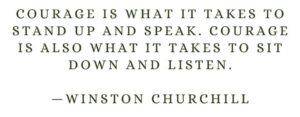“The first step is clearly defining what it is you’re after, because without knowing that you’ll never get it” ~ Halle Berry
In any type of coaching the first main question coaches ask clients is what they want to achieve. Whether it is that day or overall – the idea, of course, is to determine the goals of people who want to make changes in their lives. When it comes to conflict management coaching, clients’ goals are typically long term such as being more conflict competent, becoming less avoidant about conflict, gaining more confidence when it comes to difficult conversations and so on. The importance of getting clear on what clients and we want to accomplish when it comes to our interpersonal disputes cannot be overstated.
What I have found as a coach with a conflict specialty is that what clients say they want in conflict usually extends well beyond what issues are in dispute, and what they initially express as their hope and desire. They are often apprehensive about expressing what is on their mind and about approaching the other person to resolve or at least, discuss things. For instance, someone might say “I want to explain to my boss why I couldn’t get the job done on time and I know they will freak out and I won’t know how to deal with that!” There are many possible underlying goals here and that’s exactly what coaches aim to elicit so that there is clarity about what is most important to clients. In this example, the client’s underlying goal might be to improve the way they deliver messages, to be better skilled at responding rather than reacting to people who “freak out”, to establish a connection with the boss who might be underestimating the client’s skills and so on. So, there could be many more goals or one main one.
The message though, as you see, is to define what it is that clients (and we) are after when in dispute so that attempts to determine goals are properly focused on what is really and truly wanted and not what initially comes to us while in the heat of the dispute. As Halle Berry says in the quote above –“without knowing what you are after you’ll never get it”.
With this in mind, I invite you to bring to mind an interpersonal dispute about which you are feeling apprehensive to address. This exercise is to support you as you deconstruct the situation with these questions to gain clarity on what it is you really want.
- What is the dispute about?
- What started this conflict from your perspective?
- Where are things at right now for you?
- What would the other person say the dispute is about? What would they say started it? How might they describe where things are now?
- What do you want to have happen about the issue(s) in dispute? What else? Thinking more about it – anything else?
- What do you want to have happen with the relationship? What else?
- What might the other person want to have happen in the dispute? What else? Thinking more about it – anything else?
- What might they want regarding the relationship? What else?
- What do you fear most? What fears might the other person have?
- What are you not considering here – now that you are deconstructing that conflict – that might be fueling your apprehension about moving forward with your goals?
- What else occurs to you as you consider these questions?
- What insights do you have now that you didn’t have before you answered these questions?
(Popular – from the archives)



 I don’t know about you but, I expect you share this experience. There are disputes I look back on and I wished I’d had the courage to step up to say what was on my mind. Then, there are those other occasions when I wish I had kept my mouth shut! In either case, I have considered that we also need compassion and dignity and self-respect to manage these situations well – whether to stand up or sit down reflects the most prudent choice.
I don’t know about you but, I expect you share this experience. There are disputes I look back on and I wished I’d had the courage to step up to say what was on my mind. Then, there are those other occasions when I wish I had kept my mouth shut! In either case, I have considered that we also need compassion and dignity and self-respect to manage these situations well – whether to stand up or sit down reflects the most prudent choice. In our efforts to maintain good relationships with friends and family there are times we might begin to wonder whether it is a healthy and sustainable relationship. And this week’s Conflict mastery Quest(ions) blog focuses on when we determine a relationship isn’t working out. (Another blog will consider when someone else ends the relationship.)
In our efforts to maintain good relationships with friends and family there are times we might begin to wonder whether it is a healthy and sustainable relationship. And this week’s Conflict mastery Quest(ions) blog focuses on when we determine a relationship isn’t working out. (Another blog will consider when someone else ends the relationship.) The former U.S. Justice – Ruth Bader Ginsburg – or RBG as she was affectionately called – shared much wisdom over her years – both legally and personally. This particular quote applies to many aspects of our lives and this week’s Conflict Mastery Quest(ions) blog considers its relevance to interpersonal conflicts.
The former U.S. Justice – Ruth Bader Ginsburg – or RBG as she was affectionately called – shared much wisdom over her years – both legally and personally. This particular quote applies to many aspects of our lives and this week’s Conflict Mastery Quest(ions) blog considers its relevance to interpersonal conflicts.